VTAD Week 2025:
Start planning today! Vermont Advance Directive Week: April 13-19 | National Health Care Decisions Day: April 16
Learn more
Learn more
Video Credit: Practice Makes Perfect by The Conversation Project
Check out The Conversation Project to learn more about National Healthcare Decisions Day (NHDD) and their mission to inspire, educate and empower the public and providers about the importance of advance care planning.
_________
Having conversations early, when you are healthy, will relieve those closest to you of the burden of having to guess about what you would want in the event that you are unable to speak for yourself.

Sources: Conversation Project National Survey (2013) and Survey of Californians by the California Health Care Foundation (2012).
It is impossible to predict the exact health situation you might be in and what treatments will be available to you at that time. Discussions with those closest to you about your goals and values can help to guide the “in the moment” decisions that may need to be made and will allow you to maintain as much control over your health care as possible.
If you become too sick to make your own health care decisions and have not planned ahead for your medical care, your doctor will need to consult with your family or close friends to learn more about what you would or would not want in certain situations. The best way to guarantee that your wishes are known and honored is to talk to members of your family, close friends and health care providers about your goals and preferences for care and treatment and document them.

Learn more about how you can participate in Vermont Advance Directive Week (April 13-19, 2025)
Notifications